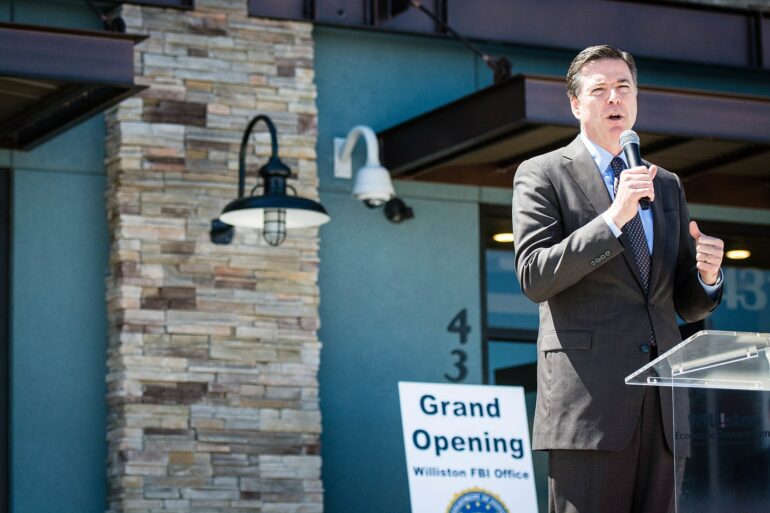Newly released Department of Justice correspondence sheds fresh light on former FBI Director James Comey’s relationship with the press, revealing that he encouraged a close associate to speak with reporters during the height of the 2016 Clinton email investigation and later praised his performance.
According to emails and text messages included in a Justice Department filing, Comey’s longtime friend Daniel Richman—a Columbia University law professor whom Comey had hired as a “Special Government Employee” with a Top-Secret clearance—served as an intermediary between the FBI director and the media on multiple occasions.
“Well done my friend,” Comey wrote to Richman in a Nov. 2, 2016 email, after reading a New York Times story that cited Richman as an anonymous source. “Who knew this would be so uh fun.” The article, titled “These Are the Bad (and Worse) Options James Comey Faced,” explored Comey’s choices after the FBI informed Congress it had uncovered “thousands of new emails” potentially relevant to its probe of former Secretary of State Hillary Clinton’s private server.
The filing was submitted by federal prosecutors opposing Comey’s motion to dismiss an indictment alleging he lied under oath and obstructed a congressional investigation. The former FBI director is accused of falsely claiming in September 2020 that he had not authorized “someone else at the FBI to be an anonymous source” in stories concerning the Clinton investigation.
Comey’s attorneys argued last month that their client was unfairly targeted for political reasons, claiming he was “singled out” because of his public criticism of then-President Donald Trump, who “harbors genuine animus” toward him. Prosecutors rejected that argument, asserting that the case is rooted in Comey’s conduct, not his politics.
“The true affront to the criminal justice system would be to allow the defendant to escape accountability for lying to and obstructing Congress under oath about actions he took while serving as the Director of the Federal Bureau of Investigation,” the DOJ wrote. “The indictment was presented by a duly appointed and unbiased prosecutor. And a duly constituted grand jury found probable cause that he committed the indicted offenses.”
The newly disclosed messages show a pattern of backchannel communication with reporters. In October 2016, Richman told Comey that The New York Times had asked him to write an op-ed, but Comey discouraged it, replying, “No need. At this point it would be shouting into the wind. Some day they will figure it out.”
Days later, frustrated by coverage, Comey told Richman to “make [the reporter] smarter.” By early 2017, Richman was again in contact with journalists about the Clinton probe, emailing then-Justice Department official Chuck Rosenberg to encourage him to speak with Times reporter Mike Schmidt about “Jim’s decisionmaking.”
In May 2017, shortly after Comey’s dismissal from the FBI, Richman texted Schmidt to confirm that Comey had granted him “clearance for me to talk as anon source.” That same day, the Times published a front-page story citing “associates” of Comey claiming President Trump had asked him for a pledge of loyalty.
[READ MORE: Former St. Louis News Anchor Charged With Killing Her Mother in Kansas]



